Emiliano Sala: Heartbroken family's wait for justice
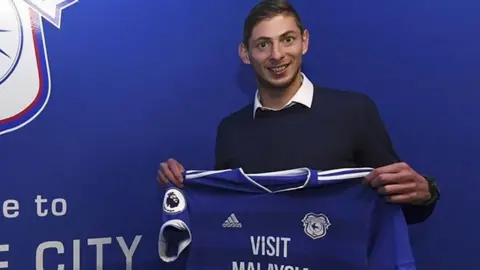 AFP
AFPAs the inquest into the death of footballer Emiliano Sala began just over three years after the plane crash in which he died, three figures watched quietly from the back row of the wood-panelled coroner's court.
Emiliano's younger brother, Dario Sala, sat just a few feet away from Nora Ibbotson, the wife of pilot David Ibbotson, and their son Bradley.
Two families, grieving a shared loss, the gulf between them - in language, culture, circumstance, geography - symbolised by the empty chairs separating them.
But with a shared purpose: to find answers to how their loved ones died.
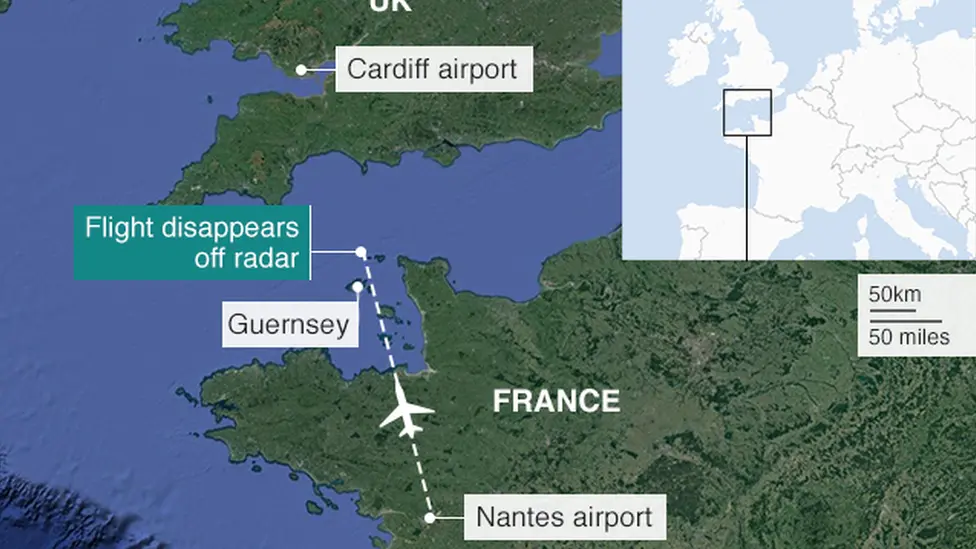
When the Piper Malibu plunged into the English Channel near Guernsey on 21 January 2019, the Sala family lost a much-loved son and elder brother, the Ibbotsons a devoted husband and father.
The body of 28-year-old Emiliano had been thrown from the plane's wreckage and was held in place by its mangled fuselage. He was brought to shore at Portland in Dorset on 7 February 2019.
No trace has ever been found of 59-year-old David Ibbotson, the passionate amateur pilot who grasped any opportunity to fly.
The plane's final resting-place was within 100 miles (328km) of where its last radar signal was detected, but it was felt to be too complex and expensive an operation to recover it.
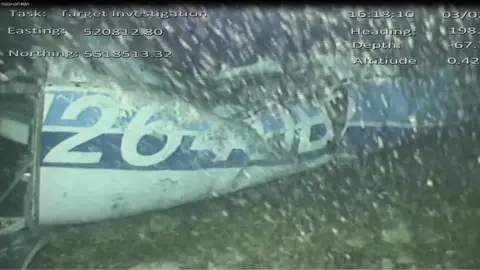 AAIB
AAIBOver the course of five weeks, the inquest jury at Dorset Coroner's Court in Bournemouth heard from air accident investigators, Civil Aviation Authority officials, police, forensic pathologists, toxicology experts, and representatives from Cardiff City and FC Nantes.
The jury of three men and six women also heard from former football agent Willie McKay - who commissioned the doomed flight for Emiliano; "aircraft broker" David Henderson who gave evidence from prison where he's serving an 18-month sentence for offences relating to his arrangement of the flight; and the plane's owner, Fay Keely - who admitted that she had never seen the Piper, let alone flown in it.
While Henderson's trial was focused narrowly on his arrangement of that flight, the inquest had a much wider brief: to explore the "how, when, why, where and what" of the star striker's death.
If Emiliano Sala sometimes felt lost in the criminal trial process, here he was front and centre: the boy who the jury heard was given little hope of thriving when he was born prematurely in Santa Fe in October 1990.
The inquest opened with the personal reflections of his mother, Mercedes Taffarel, in a statement read out to the jury.
It brought home powerfully the sacrifices Emiliano and his family had made for his passion for football, to enable him to fulfil his dream of playing at top level despite the financial constraints of his background and home life in rural Argentina.
Due to his early birth there were fears Emi - as Mercedes referred to him in her statement - might never be able to run, due to weak lungs.
But instead he thrived and, at the age of four, discovered football at the local club in his home town of Progreso, in the province of Santa Fe.
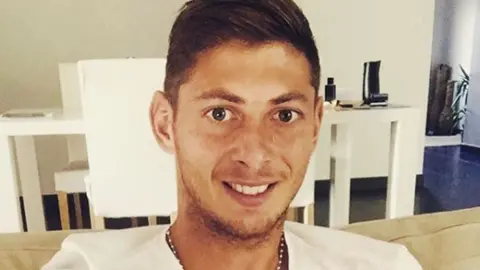 Emiliano Sala/Instagram
Emiliano Sala/Instagram"He wore a pair of sneakers, because I didn't have enough money for football boots.
"It was while playing in those little fields that his love for football started, after that day, every time he had any free time, alone or with his friends, he would go out to play with the ball and kicked it for hours," Mercedes said.
Shy and introverted off the pitch, Emiliano found his place on it.
By 14, although underage, he was playing for the first division side of the San Martin de Progreso club, and began travelling to football trials.
Scouts spotted his potential, and aged 15 he moved 125 miles (200km) away from home to train with an Argentine football college in San Francisco, Cordoba.
The San Francisco club's connections with Girondins de Bordeaux club in France gave him the opportunity to pursue his dream of playing top-level football in Europe.
"He told me that I should let him go, that all he wanted in his life was to kick a ball and if I didn't let him, I would be killing him inside," his mother recalls.
'Father figure'
As his career took off, he played for various teams in Argentina and France before joining FC Nantes in 2015 and quickly became a favourite with the club's fans, who took him to their hearts.
It was clear to see the pivotal role he played in the Sala family, described as a "father figure" for his brother and sister and regarded as the "man of the house, who led the way for all of us" despite his physical distance from them.
Learning of the crash in an early morning phone call from his agent, Mercedes said: "We didn't understand what had happened. Emi was having his best time and now this.
"The plane crash changed our lives, it's the worst thing that could have happened to us.
"Our whole family is terribly affected, we miss him each day like the first day."
The family chose a photograph of Emiliano to be shown to the jury before the inquest began. In it, he beams happily with his mother, brother and sister Romina around him.
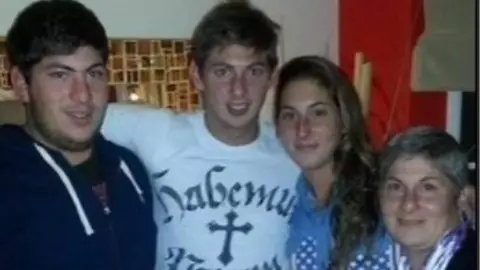 Family photo
Family photoWith his Argentine lawyer on one side and interpreter on the other, his brother, Dario Sala, listened intently as the evidence began to unfold.
At points during the evidence of pathologist Dr Basil Purdue, who carried out the post-mortem examination, he rested his head in his hands as the detail of the devastating head and trunk injuries suffered by his brother was outlined for the jury.
It was on Dr Purdue's hunch that Emiliano's blood was tested for carbon monoxide - revealing high levels of the poisonous gas, thought to have leaked from the plane's exhaust during the final minutes of the flight.
Having travelled from Argentina to the UK for the first week of the inquest, Dario was looking for answers.
By the end of the week, it was clear he would be leaving Bournemouth with more questions as new toxicology evidence came to light.
It emerged that a second sample of Emiliano's blood had revealed much lower levels of carbon monoxide contamination when analysed.
It derailed the inquest process for a few days and threatened the possibility of the Air Accidents Investigation Branch reopening its investigation into the crash.
Fortunately, it was resolved when it emerged that the second sample was not pure blood, as the first had been, and therefore less suitable for toxicological analysis.
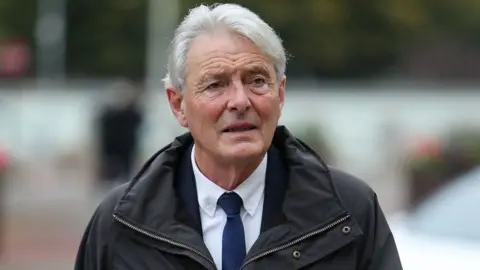 Getty Images
Getty ImagesAmid a succession of witnesses giving evidence, some of it invariably harrowing for the families and much of it very technical, some small details stick in the memory:
- The poignancy of a 28-year-old man, on the cusp of fulfilling his life's dream, hiding a smoking habit from his doting mother, his personal agent having asked hotel staff to remove cigarettes from his room in Cardiff before his family arrived.
- The pin-drop silence in the chamber for a video of the plane's final resting place, water bubbles appearing like snow falling on the mangled wreckage of the cockpit and fuselage.
- Former football agent Willie McKay telling the jury how he was "trying to do a favour for the boy" by commissioning the flight, while repeatedly saying he felt like he was "on trial" as he was questioned about his role.
- The moment the inquest heard that the plane's owner Fay Keely asked David Henderson if he had informed the pilot's family about the crash, and he had replied that David Ibbotson's only family was an ex-wife in Australia - in fact he had remarried and had two children in the UK.
Nora Ibbotson told the jury of her husband's love of flying, of his competence and confidence, and his conscientiousness about his flying and the care of his passengers.
She recalled that in conversations from Nantes before the flight, he spoke of a problem with the plane's brakes - but that he typically would not share any such concerns in case he worried her.
Her son Bradley Ibbotson returned to Bournemouth for the final week of the inquest, but Nora did not reappear.
'The greatest'
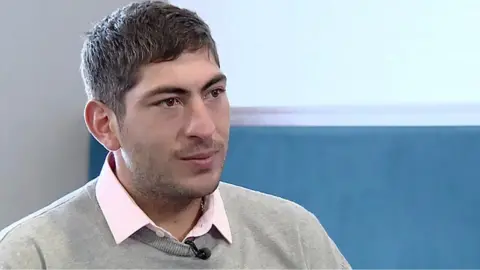
Dario re-joined the inquest on a remote link from Argentina to hear the jury's conclusions about how his elder brother died.
In an exclusive interview for a forthcoming BBC Sounds podcast, Dario said that even now, three years on, the family cannot come to terms with their loss, and believe they never will.
"For me, my brother was always the best, the greatest, even before he became a professional footballer… he was my brother," he said.
The family hope that the case will serve as a watershed moment for tackling illegal flights.
Mercedes's statement ended: "No-one can give Emi back to us, but we ask for justice, so Emi can rest in peace and give us a little peace of mind, knowing that we did everything we could so that similar deaths are prevented in future."
Podcast series Emiliano Sala: The Transfer will be released on BBC Sounds later this year.
